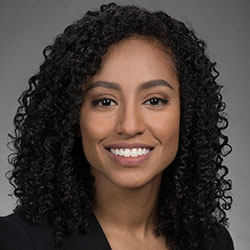
Arianna Barkley, M.D., joined the Department of Neurosurgery this summer as a pediatric fellow.
Barkley was born in Port of Spain, Trinidad and Tobago and raised in Ontario, Canada. She completed her undergraduate training in Molecular and Cellular Biology, Psychology with a minor in Philosophy at the Johns Hopkins University in Baltimore, Maryland.
Following her undergraduate studies, Barkley spent a year working as a clinical assistant at Kennedy Krieger Institute caring for severely autistic children prior to attending The University of Pennsylvania School of Medicine in Philadelphia, PA.
While at the University of Pennsylvania School of Medicine, Barkley exhibited a passion for serving underserved communities as demonstrated through her work with Habitat for Humanity and the Student National Medical Association.
As a resident at the University of Washington Neurological Surgery Program, she worked with the UW School of Public Health to improve capacity for neurosurgical care in Cambodia and Vietnam and collaborated with the Duke Global Neurology and Neurosurgery Program.
Barkley’s academic interests include international neurosurgery and resident education.
Get to know Dr. Barkley
Why did you select UAB for fellowship?
UAB afforded a unique opportunity to merge my love of working with pediatric patients presenting with a wide array of pathologies to my passions in global health and its intersection with neurosurgery. The Children's of Alabama Pediatric Neurosurgery Program provided me the perfect balance between a welcoming, caring culture with comprehensive and vigorous neurosurgical training, so I felt honored to have the opportunity to learn from these leaders in the field.
What are you most excited about in completing the pediatric fellowship program?
I am most excited to have the privilege of working with patients and their families as their pediatric neurosurgeon and to help and counsel them using all the tools, techniques and clinical pearls I have gathered through studying my mentors. I am also excited to continue the learning process and have the opportunity to contribute to the future evolution of our field through international endeavors. I am eager to see how new treatments and technological advancements change how we manage the wide array of pathologies that can afflict our pediatric population and hope to give back to the field by contributing in any small way I can to its advancement.
What do you like to do in your free time?
Free time is usually spent either running, hiking, training for obstacle course races, reading, traveling and finding new restaurants!